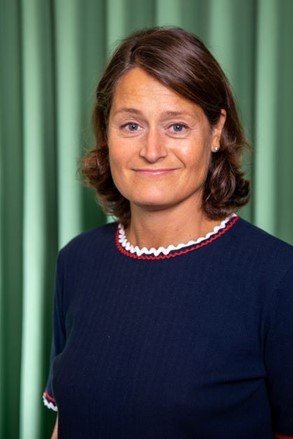Biometric-enabled payment cards are among the innovations being recognised as key to ensuring security and transaction experience amid increasing contactless limits.
Earlier this year, challenger bank Rocker launched Sweden’s first biometric payment card – a huge commercial milestone and a step forward for the inclusive and diverse payment ecosystem. Supported by IDEMIA and powered by IDEX Biometrics’ cutting-edge fingerprint sensor technology, the card is easy to use, helping customers improve their financial lives without PINs or passwords.
Diversity and inclusivity have been instrumental in bringing the industry to this point as well as being a key focus for the future.
HERE, CATHARINA EKLOF, CHIEF COMMERCIAL OFFICER OF IDEX BIOMETRICS, A LEADING PROVIDER OF FINGERPRINT IDENTIFICATION TECHNOLOGIES, REFLECTS ON HOW TO CULTIVATE AN INCLUSIVE ETHOS AND DRIVE FUTURE GROWTH AND INNOVATION IN PAYMENT TECHNOLOGY.

Catharina Eklof is Chief Commercial Officer of IDEX Biometrics (NASDAQ: IDBA) where she brings seamless payment experiences to consumers around the world through world-leading biometric sensor solutions. She is also a non- executive board director of Avanza Bank (NASDAQ Stockholm: AZA) Sweden’s largest digital bank.
Catharina has 20 years of global executive management across financial services, retail, travel, and security. She has led the commercialisation of new customer-centric solutions across Fortune 500 companies including more than 12 years spent in leadership roles at Mastercard in Brussels, London, and New York. Catharina established Mastercard’s global strategic merchant program, bringing digital payment solutions and new, data-driven business models to organizations around the world.
Catharina Eklof holds an MBA in International Business and a Master of Science in Economics from the University of Uppsala, Sweden. She is based in Brussels, Belgium.
HOW INCLUSIVE IS THE PAYMENT ECOSYSTEM?
Women are one of the most excluded demographics in payments. This is a worldwide issue, but particularly so in developing countries. One reason for this is that women are less likely to own a mobile phone or use mobile internet.
Despite this, women still make up the majority of today’s retail consumers – indicating a missed opportunity for growing economies. IDEX research shows that most women are comfortable embracing biometric technology to overcome the digital divide. In one example, 91% of women in Brazil are ready to switch from PIN to fingerprint authentication for in-store payments.
Payment diversity, however, doesn’t stop at women – it includes making payments accessible to all demographics, including the elderly, vulnerable and unbanked populations. Those suffering from dementia, literacy challenges or impaired vision can find current payment methods extremely challenging and introducing fingerprint biometrics into payment cards offers a simple and easy way to authenticate payments with the simple touch of a finger.
IS FINANCIAL INCLUSION AN ISSUE THAT NEEDS TO BE TACKLED GLOBALLY?
Absolutely. Today, despite increasing numbers of people gaining access to banking services, over one billion adults remain unbanked around the globe. While the majority of the unbanked live in the developing world, around 42% of Europeans currently lack basic digital skills that prevent them from accessing online or mobile banking.
This needs to be tackled head-on to ensure people have access to paid services, especially in countries that are moving away from the use of cash.
For example, in 2020, just 9% of all transactions in Sweden used cash.
Advances in biometric fingerprint authentication can be particularly effective to support these consumers as the person is linked directly to their card by fingerprint alone, without a smartphone or need to remember PINs. Remote enrolment capabilities also mean that users don’t need to visit a bank branch to start using this technology.
HOW CAN THE BIOMETRICS INDUSTRY ITSELF BECOME MORE DIVERSE – AND ATTRACT MORE DIVERSE TALENT?
Currently women make up only 28% of the workforce in science, technology, engineering and math (STEM) roles. In order to grow these industries, this urgently needs to change. Biometrics is just one field a diverse workforce is beneficial.
As a field underpinned by a wide span of technologies including system engineering, custom ASIC, sensor development and cryptology, the biometric industry requires the creativity and collaborative power of every possible diverse mind and personality. Everyone has a unique background experience, and a unique perspective.
Problems are solved faster and more elegantly when everyone approaches a problem a different way.
Attracting a diverse talent pool to the industry, therefore, will not only help strengthen it but also deliver future growth.
HOW ARE YOU ENCOURAGING WOMEN AND THOSE WITH DIVERSE BACKGROUNDS TO PURSUE CAREERS IN THE SECTOR?
I have always supported women in the industry, starting with my involvement in the women’s talent programme while at Mastercard, which included mentorship, training and networking on a global scale. At IDEX, I continue to mentor new talent and share my own experiences within tech. In addition to supporting women in my industry, together with the IDEX team I am formalising our engagement around diversity and inclusion. We are establishing our ESG agenda, ensuring that sustainability and diversity is integral to who we are as a business and how we operate.
As a woman in an executive role in a heavily male-dominated industry, I am in a privileged position to act as a bridge for women who are interested in biometrics but may feel that the industry is too specialised. Here, IDEX is focused on connecting a very powerful technology with use-cases that have real meaning and can make a real difference for millions of people – and that’s something that many people can become a part of.
IDEX is a firm believer in the importance of promoting inclusion. This means offering financial education and developing solutions that foster an inclusive environment for those of diverse backgrounds or for those who would otherwise be financially excluded. Biometric payment cards and offline wallets (a digital wallet that is stored on a platform not linked to the cloud or internet) are concrete solutions to supporting financial inclusion around the globe by providing simple and secure authentication to all.
HOW IS IDEX BIOMETRICS BUILDING AN INCLUSIVE FUTURE WITH DIVERSITY AT THE HEART?
IDEX Biometrics is leading the way in biometric technological development. We believe diversity and inclusion is part of our DNA, which brings with it immeasurable innovation and developmental potential. Our diverse team of engineers has pioneered the industry. Our 120 team members operate across 13 different locations around the world and speak over 12 languages. Whilst there is always more to be done, we are pleased by the growing number of women in leadership roles.
We are committed to building solutions that will drive payment inclusion around the world, actively working alongside card manufacturers and financial institutions to bring biometric payment cards to the mass market and tackle the challenges around financial inclusion.
Inclusion and diversity are essential to the future of tech and payments, paving the way for a more equal payment ecosystem and untapped innovation and growth.







